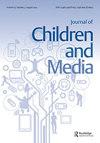Parental mediation and problematic media use among U.S. children with disabilities and their non-disabled siblings during the COVID-19 pandemic
IF 2.1
3区 心理学
Q2 COMMUNICATION
引用次数: 1
Abstract
ABSTRACT During the COVID-19 pandemic, caregivers of disabled children have faced adverse conditions complicating their media use management (i.e., parental mediation). Disabled children and non-disabled children in a household may also have distinct cognitive, emotional, and physical needs requiring different parental mediation strategies. In this exploratory study, we surveyed U.S. parents (N = 123) with a disabled and non-disabled child between the ages of 5 and 13 to explore child differences in average hours spent watching media and playing games, problematic media use, and parental mediation during the early part of the COVID-19 pandemic (Spring 2020–Spring 2021). Results suggest higher problematic media use for children with disabilities compared to their siblings without disabilities during the pandemic, with rates of problematic use primarily increasing or staying the same for both, but significantly more parental mediation of children without disabilities compared to those with disabilities. In the wake of the pandemic and spikes in children’s media use, screen time advice from health providers to households with both disabled and non-disabled children requires unique considerations to support healthy child media use. IMPACT SUMMARY Prior State of Knowledge: Media have offered young people important opportunities for learning, entertainment, and social connection during the COVID-19 pandemic, but parents also have concerns about overuse and negative effects. Novel Contributions: We surveyed parents of school-age siblings with and without disabilities to compare media use patterns, problematic media use, and parental mediation. We found higher rates of problematic media use among disabled children, but more parental mediation of non-disabled children. Practical Implications: Practitioners who provide screen media guidance to households with both disabled and non-disabled children should consider these families’ unique considerations and circumstances, including how siblings mutually influence one another’s media use, as well as their parents’ overall caregiving practices.新冠肺炎大流行期间,美国残疾儿童及其非残疾兄弟姐妹的父母调解和媒体使用问题
摘要在新冠肺炎大流行期间,残疾儿童的护理人员面临着使其媒体使用管理(即父母调解)复杂化的不利条件。家庭中的残疾儿童和非残疾儿童也可能有不同的认知、情感和身体需求,需要不同的父母调解策略。在这项探索性研究中,我们调查了美国父母(N = 123)与一名5岁至13岁的残疾和非残疾儿童合作,探讨儿童在新冠肺炎大流行早期(2020年春季至2021年春季)观看媒体和玩游戏的平均时间、有问题的媒体使用和父母调解方面的差异。结果表明,在疫情期间,残疾儿童与非残疾兄弟姐妹相比,有问题的媒体使用率更高,两者的问题使用率主要增加或保持不变,但与残疾儿童相比,非残疾儿童的父母调解明显更多。在疫情和儿童媒体使用激增之后,卫生服务提供者向有残疾和非残疾儿童的家庭提供的屏幕时间建议需要独特的考虑因素来支持健康的儿童媒体使用。影响总结先前的知识状况:在新冠肺炎大流行期间,媒体为年轻人提供了重要的学习、娱乐和社交联系机会,但家长也担心过度使用和负面影响。新颖贡献:我们调查了有残疾和没有残疾的学龄兄弟姐妹的父母,以比较媒体使用模式、有问题的媒体使用和父母调解。我们发现残疾儿童使用问题媒体的比率更高,但非残疾儿童的父母调解更多。实际意义:为有残疾和非残疾儿童的家庭提供屏幕媒体指导的从业者应考虑这些家庭的独特考虑和情况,包括兄弟姐妹如何相互影响彼此的媒体使用,以及他们父母的整体护理实践。
本文章由计算机程序翻译,如有差异,请以英文原文为准。
求助全文
约1分钟内获得全文
求助全文

 求助内容:
求助内容: 应助结果提醒方式:
应助结果提醒方式:


